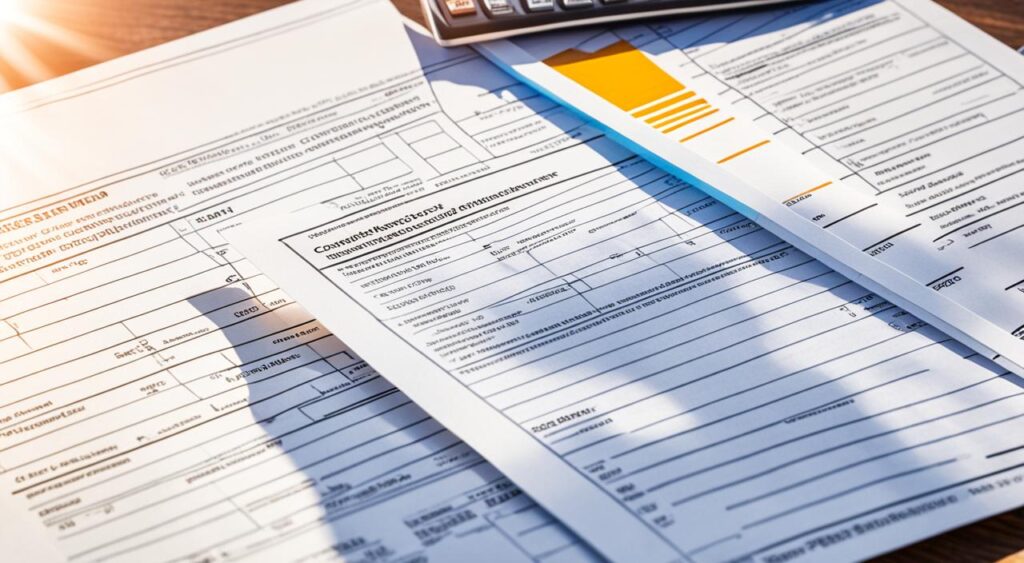Solar Licensing: Requirements and Certification Guide
The demand for solar power systems is growing fast in the United States. But, understanding solar licensing and certification can be tough for homeowners, businesses, and solar contractors. This guide will help you get the knowledge you need to make sure your solar project follows the rules and meets standards.
Key Takeaways
- Understand the residential and commercial solar permit requirements in your state and local area.
- Learn about the necessary solar contractor licensing and certification for legal solar installations.
- Discover the importance of solar code compliance and the National Electrical Code standards.
- Stay informed on the latest solar energy legislation and emerging trends impacting your solar project.
- Utilize a comprehensive solar project licensing checklist to ensure your solar system is properly licensed and compliant.
Navigating the Maze of Solar Licensing
Getting into solar licensing can feel overwhelming, with many rules at the federal, state, and local levels. As solar energy grows in the U.S., knowing about solar licensing, solar regulations, and solar permit requirements is key for homeowners, businesses, and installers.
We’ve put together a guide to help you through the complex world of solar licensing. It covers everything from permits and approvals to following local and national codes. This section aims to give you the info you need to smoothly go through the solar licensing process.
- Learn about the solar licensing rules in your area, including state or local laws that apply.
- Find out what solar permits you need for your project, whether it’s for a home or a business.
- Know the solar regulations for installing and connecting solar systems, like safety and electrical standards.
- Make sure your solar contractor is licensed and certified in your area. This is often a must for getting permits.
- Keep up with any changes in solar licensing laws and rules, as they can change fast.
| Solar Licensing Requirement | Description |
|---|---|
| Contractor Licensing | Solar installers and contractors need to be licensed and certified in your state or area. This makes sure they have the skills and insurance to do the job safely and right. |
| Electrical Permits | Solar projects need electrical permits to make sure they follow local and national electrical codes, like the National Electrical Code (NEC). |
| Building Permits | You might need building permits for your solar project, depending on its size and location. These permits check if the installation meets local building standards. |
| Interconnection Agreements | If your solar system connects to the grid, you’ll need an interconnection agreement with the local utility. This ensures the system meets their safety and technical standards. |
By understanding solar licensing and following all solar regulations and solar permit requirements, you can make your solar project successful and smooth. Stay informed, work with licensed pros, and you’ll be ready to use the sun’s power.

Understanding Solar Licensing Basics
Before starting a solar project, knowing the licensing and permitting rules is key. We’ll look at what you need for home solar setups and commercial projects.
Residential Solar Permits and Regulations
If you want to put solar panels on your home, you’ll need to follow certain rules. Each place has its own solar regulations for permits, inspections, and paperwork. It’s important to know these rules before you begin.
- Typical residential solar permit requirements may include structural, electrical, and building permits.
- Homeowners may also need to submit detailed plans, diagrams, and specifications for their solar system.
- Inspections from local authorities are usually required at various stages of the installation process.
Commercial Solar Project Requirements
Commercial solar projects have more complex rules than home setups. They need extra steps, like zoning checks and environmental studies.
- Commercial solar projects may require permits from local, state, and federal agencies.
- Detailed engineering plans, often stamped by a professional engineer, are typically required.
- Depending on the project size and location, environmental impact studies may be necessary.
Knowing about solar permit requirements, solar regulations, and solar project licensing is key for a successful solar project. By understanding these steps, you can make sure your project goes smoothly and meets all the rules.

The Importance of Solar Contractor Licensing
Working with a licensed and certified solar contractor is key for a successful and safe solar project. Licensing and certification show the contractor’s skills and protect homeowners and business owners. They make sure the work is done right.
Different states have their own rules for solar contractor licensing and certification. It’s important to know what’s needed in your area. A licensed contractor has passed exams, has insurance, and follows industry standards.
Here are the benefits of hiring a licensed solar contractor:
- Expertise and experience in solar system design and installation
- Adherence to safety protocols and building codes
- Proper permitting and inspections to meet local regulations
- Warranty and guarantee on the work performed
- Protection against potential liability issues
When looking for a solar contractor, ask about their license and certification. A good contractor will share this info and show they care about quality and following the rules.
| Benefit | Explanation |
|---|---|
| Expertise and experience | Licensed solar contractors have undergone extensive training and possess the necessary skills to design and install solar systems safely and efficiently. |
| Adherence to safety protocols | Licensed contractors are required to follow industry-standard safety practices, protecting both the homeowner and the installation crew. |
| Proper permitting and inspections | Licensed contractors understand the local permitting process and ensure your solar project meets all relevant building codes and regulations. |
| Warranty and guarantee | Reputable licensed contractors offer warranties and guarantees on their work, providing additional peace of mind for the homeowner. |
| Liability protection | Working with a licensed contractor shields homeowners from potential liability issues that may arise during the installation process. |
Choosing a licensed and certified solar contractor is vital for a successful and safe solar project. With a qualified professional, you can trust that your installation will meet the highest standards and follow all the rules.
Solar Licensing: Requirements and Certification Guide
Understanding solar licensing and certifications can seem tough, but it’s key for your solar project’s success. We’ll cover the main requirements and best practices to keep you compliant and on the right path.
First, let’s talk about solar licensing. Contractors and installers need the right licenses and certifications to legally install solar panels. This makes sure the work is safe and meets local and state rules.
- Solar Contractor Licensing: Depending on where you are, solar contractors might need a specific license. This could be an electrical or general contractor’s license for solar installations.
- Solar Installer Certification: Many places and groups, like the North American Board of Certified Energy Practitioners (NABCEP), offer solar installation certifications. These show the installer’s skills and knowledge of solar systems.
- Solar Permitting: Solar projects also need permits from local authorities. This makes sure the installation follows all building, electrical, and safety codes.
To make sure your solar project meets all the rules, it’s important to check the specific requirements in your area. Talk to local authorities, industry groups, and experienced solar pros to get the steps and documents you need.
| Solar Licensing Requirement | Description |
|---|---|
| Contractor License | You usually need an electrical or general contractor’s license to do solar installations. |
| Installer Certification | Certification programs for solar installers, like NABCEP, show they know their stuff. |
| Solar Permitting | Getting permits from local authorities makes sure your installation follows all the rules. |
By keeping up with the solar licensing and certification needs in your area, you can confidently go through the process. This way, your solar project will be a success.
Ensuring Solar Code Compliance
Understanding solar-specific building codes and regulations is key for your solar project’s safety and legality. You need to follow national, state, and local rules. We’ll go over these details to help you with solar code compliance.
National Electrical Code Standards
The National Electrical Code (NEC) sets the rules for solar system installation and safety. Following NEC guidelines is a must, not just a good idea. It covers wiring, grounding, and overcurrent protection, making sure your solar system is safe.
State and Local Solar Regulations
While the NEC sets a national standard, your solar project must also meet state and local rules. Each place has its own building codes, permits, and inspections. It’s important to keep up with local solar laws to avoid delays or even stopping your project.
- Research your state’s solar-specific building codes and regulations.
- Familiarize yourself with local permitting and inspection processes.
- Consult with your solar installer or local authorities to ensure full compliance.
Knowing and following both national and local solar code compliance rules protects your solar project. It also keeps your investment safe and ensures your solar panel legal compliance.
Solar Panel Legal Compliance: A Must-Have
In the fast-changing world of solar energy, making sure your solar panels follow all laws and standards is key. It can be tough to keep up with solar energy laws, but it’s vital. It helps protect your investment and keeps your solar power system safe.
Legal rules and standards for solar panels cover many areas. They include electrical safety codes and zoning laws. Keeping up with these laws is important to avoid fines, delays, and legal problems.
As solar energy grows, laws and rules are changing. Solar panel legal compliance is now a must for anyone with a solar energy system. It’s not just an option anymore.
- Following national electrical codes, like the National Electrical Code (NEC), makes sure your solar power system works safely and well.
- State and local laws might have rules on where to put solar panels and how to maintain them.
- Knowing about new solar energy legislation helps you get ready for changes in the industry. This keeps you ahead.
Putting solar panel legal compliance first helps protect your investment and supports the solar energy industry’s growth. With more people wanting renewable energy, knowing the laws well will be key to a greener future.
Staying Ahead of Solar Energy Legislation
The solar industry is always changing, so it’s important to keep up with new laws and trends. These changes happen at the federal, state, and local levels. Knowing about them is key to making your solar project successful.
Emerging Solar Trends and Laws
Now, we’re seeing a big push for sustainability and reducing our environmental impact. Many places are making new rules to encourage solar energy and cut down on carbon emissions. They offer incentives, tax credits, and laws that push for more renewable energy and energy efficiency.
There’s also a growing need for solar energy systems that can keep power going during outages. With more extreme weather, there’s a focus on making sure the electrical grid is reliable. This means new rules for designing, installing, and keeping up solar projects.
| Emerging Solar Legislation | Key Provisions |
|---|---|
| Solar Energy Mandate | Requires a certain percentage of energy to be generated from solar sources by a specific deadline |
| Renewable Energy Tax Credits | Provides tax incentives for individuals and businesses to invest in solar energy systems |
| Grid Modernization Initiative | Funds upgrades to the electrical grid to accommodate more renewable energy sources |
It’s crucial to keep an eye on solar laws and regulations at all government levels. By staying updated, you can make sure your solar project follows the rules and is set up for success.
The Solar Project Licensing Checklist
We’ve put together a detailed solar project licensing checklist to help you stay on track. It covers all the important steps and what you need for your solar setup. This guide will make sure you get the right licenses and permits.
Start by learning about the rules for solar projects in your area. Know what documents you need, what inspections are required, and the codes you must follow. Talk to your local building and zoning offices to get the right permits before starting your project.
Make sure your solar contractor is licensed and certified for the job. Check their credentials, insurance, and if they follow the best practices in the industry. This keeps your solar setup safe and protects you from legal and financial issues.

